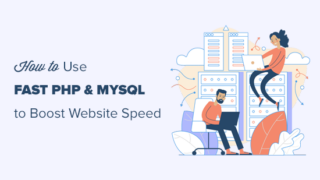Ever wondered what’s the impact of PHP and MySQL on your website speed?
WordPress is written in PHP programming language and uses MySQL as the database. Both programs run on your web server thus impacting overall performance.
In this article, we’ll discuss how fast PHP and MySQL can boost website speed. We’ll also talk about how to enable it for your website.

Table of Contents
How Faster PHP + MySQL Affects WordPress Performance
WordPress is mainly written in PHP, a programming language that runs on your web server. It stores your website content in a MySQL database.
Both PHP and MySQL run on your web server as an application. When more users visit your website, PHP and MySQL take up more server resources.
Most websites address this by using a WordPress caching plugin. However, processes like .htaccess rules, PHP extensions, and SQL queries can still increase server load.
Faster PHP and MySQL optimize these regular processes to improve their performance and speed. The more traffic your website gets, the more of a performance improvement you’ll see.
This is where Ultrafast PHP can help.
What is Ultrafast PHP?
Ultrafast PHP is an optimized version of PHP which is built by the team at SiteGround. Since WPBeginner is hosted on SiteGround’s Enterprise hosting plan, we were one of the first websites to try it and see the speed benefits.
Now SiteGround is making this feature available to all their customers on their GrowBig, GoGeek and Cloud hosting plans.
For high-traffic websites, Ultrafast PHP can increase performance by up to 30% and reduce TTFB (time to first byte) by 50%.

Your server load will also be reduced, and it will be able to run up to 20-30% more processes while consuming 15% less memory (RAM).
SiteGround is one of the best WordPress hosting companies on the market. They are also an officially recommended WordPress hosting provider.
Since they use Google Cloud Platform for their servers, this allowed them the flexibility to work on an optimized PHP setup (Ultrafast PHP) that is optimized for their customers’ needs.
Who Needs Ultrafast PHP?
If you have a medium sized WordPress website or an online store, then you need Ultrafast PHP to help you boost performance.
Ultrafast PHP is currently available to users on the GrowBig, GoGeek, and Cloud plans. Usually, these are the users with busier websites that often end up hitting server resource limitations.
This feature is not available to users using the old control panel on SiteGround. However if your hosting account dashboard is using SiteGround’s new client area and Site Tools control panel, then you can turn on Ultrafast PHP. We’ll show you how below.

If your website is super small, then you may not notice much difference. We recommend that you use a caching plugin like WP Rocket or SiteGround’s own SG Optimizer plugin.
If you have a small business website or new blog with not much traffic yet, then you may not need Ultrafast PHP because the latest version of PHP is already optimized for performance. So make sure you are using the latest PHP version for your website.
How to Enable Ultrafast PHP on SiteGround
It is super-easy to enable Ultrafast PHP for your WordPress website on SiteGround. Your hosting account should meet the following criteria:
- Your sites are hosted on SiteGround’s GrowBig, GoGeek or Cloud plans
- Your account is using the new client area and site tools control panel
Simply log in to your account and click on the ‘Websites’ menu on the top. After that, click on the Site Tools button next to the website where you want to enable Ultrafast PHP.

From here, you need to click on the PHP Manager menu located under the Dev tab in the left column.

Now, you need to click on the Standard PHP option to change it. This will bring up a popup where you can switch to Ultrafast PHP.

Click on the Confirm button to continue.
You will now see a success message informing you that Ultrafast PHP is now enabled for your website.

Testing Your Website Speed after Enabling Ultrafast PHP
You can use Google Pagespeed Insights or any other website speed testing tool to test your performance.

Take a look at metrics like server response time and time to first byte to gauge the performance of your website.
We hope this article helped you learn how fast PHP and MySQL can boost website speed. You may also want to see our complete WordPress performance optimization guide for more tips to speed up your website, and check out the best email marketing services for small business.
If you liked this article, then please subscribe to our YouTube Channel for WordPress video tutorials. You can also find us on Twitter and Facebook.
The post How Fast PHP & MySQL Can Boost Website Speed (Beginner’s Guide) appeared first on WPBeginner.




